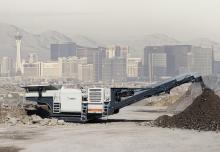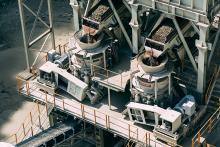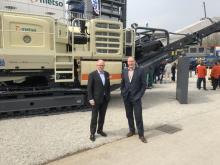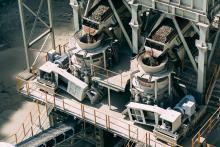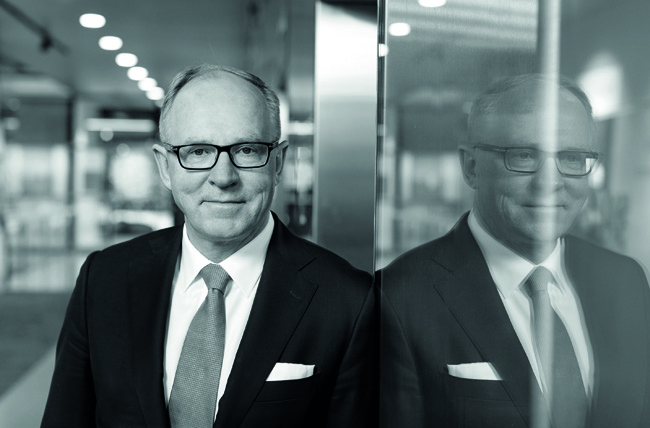
Since becoming
Pekka Vauramo was in good spirits when we met at St James’s Hotel & Club in Mayfair, central London. He was in England’s capital city for a series of meetings with Metso investors, making the release of the company’s encouraging full-year 2018 and Q4-2018 trading summaries very well timed indeed. They showed how the Helsinki, Finland-headquartered global quarrying equipment market manufacturer increased its sales by 32% in constant currencies from the previous year. Metso Q4-2018 sales were also up 23% in constant currencies compared to the same three months of 2017. Further figures revealed that orders received were up by 17% in 2018 to €3.499bn (€2.982bn in 2017). Meanwhile, company operating profit (EBIT) for 2018 totalled €351mn, or 11.1% of sales (€218mn, or 8.1% of sales in 2017).
What made Metso’s full-year 2018 and Q4-2018 performance even more impressive was that it came during a period of big upheaval in how the company operates. After just five months in his dual post, Nico Delvaux, a Belgian national, departed as Metso president and CEO on 2 February 2018 to take over as CEO of the world’s biggest lock maker, Assa Abloy. His departure to the Swedish firm came after he had reconfigured Metso to operate under seven dedicated business areas, instead of three, from 1 January last year. The business areas - covering Mining Equipment, Aggregates Equipment, Minerals Services, Minerals Consumables, Recycling, Pumps and Valves - were each given their own dedicated leadership and management teams, with their heads reporting to the CEO and president and becoming members of the company’s executive team.
Speaking to Aggregates Business magazines in November 2017, Delvaux, a former senior executive at
After Delvaux’s surprise departure, Metso’s chief financial officer, Eeva Sipilä, became interim president and CEO, a position she maintained until Vauramo’s arrival late last year, from Finnair, where he had served as CEO and president since 2013.
“Eeva Sipilä did a great job pulling things together and making sure the changes Nico introduced were implemented. As the chairman of our board said, in a good way, ‘She has an iron hand in a silk glove!’”
Vauramo has been impressed by how quickly Metso’s new business areas and management team reporting structures have taken effect. “We grew our sales by a big number last year. If there is a need to fine-tune things, we will do so. But I’m not going to change things just because I want to put my stamp on Metso. When I arrived, I saw no-one internally fighting back against these changes. Quite rapidly, we have gained a much better control of business and greater understanding of issues, such as those linked to supply chains.”
No stranger to the quarrying and mining industries, Finnish national Vauramo’s career path prior to his years at Finnair had seen him hold several leading positions at Cargotec Corporation (2007-2013),
Switching to his first full-year priorities as Metso CEO and president, he says: “There are lots of capable people at Metso. What I want to emphasise is the importance of technology and R&D [research & development] in our business. Our customers expect us to deliver reliable technologies that will enhance their businesses. We need to deeply imbed this in what we do. This could partly come from looking outside Metso to see if there are other technologies we can acquire that will improve what we do.
“The mining industry is talking a lot about automation, and everyone in ours is talking about data analytics and digitisation. The quarrying and aggregates industry can also contribute to this discussion with telematics that produce more value-adding information for customers. Consumables and wear parts replacement are key areas within crushing and screening and we want to focus on creating a higher level of predictive maintenance technology to use with our machines.”
Vauramo describes his leadership style as “being involved in a business”. He is also keen to stress the importance of strategic internal investment. “Companies need to spend money to create better futures for themselves. We need to make people excited about what we do. At Finnair, I learned so much about people and where you can get to if you have people behind you, who understand their roles within an organisation. With Metso, I know a lot more on the technical side of its business than the equivalent at Finnair.”
At the recent bauma 2019 exhibition in Munich, Germany, the world’s largest construction and quarrying equipment showcase event, Metso staged the global launch of a claimed ground-breaking truck body innovation for off-highway trucks. Combining the benefits of rubber and high structural strength steel, the Metso Truck Body is said to enable mines and quarries to haul more while lowering their operating costs. The launch expands Metso’s product offering into completely new territory.
Metso also gave an exclusive preview at bauma 2019 of the Urban LT96, the latest addition to the company’s Lokotrack Urban plant range. Urban models are designed for crushing in densely populated environments, such as city centres. The units are said to enable up to 60% better noise protection and cut dust emissions.
Another bauma 2019-launched Metso model was the Metso MX3 cone crusher with patented Multi-Action crushing technology. The ‘little brother’ of the
Metso also unveiled at the Munich showpiece event the compact Lokotrack ST2.3 mobile multi-use screen, said to be ideal for secondary and tertiary crushing applications, such as producing aggregates for railway ballast, road construction, asphalt and concrete fractions.
After bauma 2019 Metso reported double-digit growth in both its sales and received orders in the first three months of 2019, Vauramo’s first full quarter as Metso CEO and president. The company’s sales rose 17% to €836 million (compared to €714mn in Q1 2018). Metso recorded an 18% increase in its received orders which totalled €1.013bn (€859mn in Q1 2018), while EBITA (earnings before interest, taxes and amortisation) for the quarter stood at €104 million, or 12.4% of sales (€85mn, or 11.9% in Q1 2018).
Vauramo says he is pleased with the “rapid growth” of Metso’s aggregates business in recent years, both in terms of product development and sales. “We have very solid products that have a nice heritage – such as the Lokotrack plant that come out of our Tampere [Finland], former Lokomo, production facility.
“We are expanding into growing markets. There are interesting developments in China and, especially, India. I was very positively surprised by Metso’s success there, as it has been a very challenging place for many companies to do business in.''
Metso recently completed the expansion of its Metso Park production facility in Alwar, India. With this expansion Metso is addressing the growing demand for crushing and screening solutions in the Indian market, as well as improving the availability of products for export operations to Asia.
Metso launched operations in India in 1992 and has since been developing a strong footprint in the market. In 2018, the company announced a new foundry project in Vadodara to increase metallic wear castings capacity, and it acquired a valve automation division of Rotex Manufacturers and Engineers Private Ltd. Today Metso is present in India with over 1200 employees in seven regional offices, five production units and foundries, and an extensive service and distribution centre network across the country.
Since our interview in London, Vauramo has visited Metso Park in Alwar as part of a comprehensive tour of Metso’s key world-region operations.
“Our continuing investment in our infrastructure in India is a sign of our belief in that market,” he stresses.
Focusing on Metso’s trading in China, Vauramo highlights the success of the manufacturer’s joint venture businesses based in the south of the vast country - with LiuGong in Liuzhou, Guangxi province, and with Shaorui Heavy Industries near Hong Kong in Guangdong province. “Both these joint venture companies are in the black and in a growth phase. It’s a good position to be in when things are looking prosperous in China, as they are in India.
“We have a good opportunity to grow our plant sales in China. The government ban on using river sand in construction means more aggregates suppliers are looking to produce manufactured sand, which our plant is well suited to. The Chinese have also decided to convert their concrete highways into asphalt highways, and new regulations state that all the construction materials for this need to be reused. Small quarries are also being consolidated due to new safety rules and regulations, so many won’t get operating licences. This creates bigger industrial set-ups.”
Metso has well over 100 official aggregates business distributors globally, with many also selling yellow iron machines from a variety of leading OEMs, such as
“It’s important that we understand our dealers’ and distributors’ businesses, as well as the businesses of our customers. What is good business for them? If it’s not good for them, it won’t be good for us. When I recall some of the successful plant manufacturer-distributor relationships in my previous roles at other companies in this sector, there was a lot of planning and collaboration on how both parties could benefit from a specific working relationship. For example, very often there are trade-ins and the right distributor might take a wheeled loader and excavator in exchange for a customer taking a Lokotrack crusher.”
Asked about how the global aggregates processing industry is likely to look in ten years’ time, Vauramo says: “I think technology will be playing a big part in it, some of which we are currently not yet aware of. I also hope Metso is the equipment market leader and is very much seen as that by our peers.”
After growing up in Lahti, a city around one hour’s drive north-east of Helsinki, and obtaining a Master of Science MSc (Tech) degree in Mining Engineering, Vauramo, now in his early 60s, has been used to juggling a busy and successful career with family life. “I’m married, and my wife and I have two daughters, a son and two granddaughters. My work week starts Sunday evening and ends Friday night. If I’m not travelling I dedicate my weekend to family. It’s been like that the last 20 years. Having the weekends for family helps to calibrate the mind.
“Like many Finns, I love ice hockey. It’s such a high-tempo sport. Last time I played was three years ago. If my working schedule and health permits, I hope to play again one day.”
Putting on ice skates, picking up an ice hockey stick and dispatching a puck at great speed into the back of a net sounds like a pretty good way to unwind after a hectic, travel-heavy working week. Perhaps I should try it!

